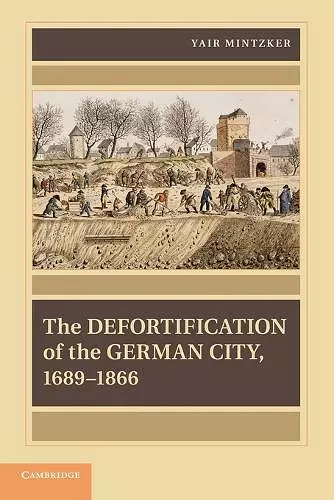The Defortification of the German City, 1689–1866
Format:Paperback
Publisher:Cambridge University Press
Published:6th Mar '14
Currently unavailable, and unfortunately no date known when it will be back
This paperback is available in another edition too:
- Hardback£90.00(9781107024038)

This book tells the story of German cities' metamorphoses from walled to defortified places between 1689 and 1866.
In the early modern period, all German cities were fortified places. Because contemporary jurists have defined 'city' as a coherent social body in a protected place, the urban environment had to be physically separate from the surrounding countryside. This separation was crucial to guaranteeing the city's commercial, political and legal privileges. Fortifications were therefore essential for any settlement to be termed a city. This book tells the story of German cities' metamorphoses from walled to de-fortified places between 1689 and 1866. Using a wealth of original sources, The Defortification of the German City, 1689–1866 discusses one of the most significant moments in the emergence of the modern city: the dramatic and often traumatic demolition of the city's centuries-old fortifications and the creation of the open city.
'The title of [this] book is far too modest. Taking the demolition of the old city walls as pars pro toto for the destruction of the old body politic, Yair Mintzker offers an absolutely fascinating new insight into the transformations that led to modern society. His book is a genuine masterpiece of political history after the cultural turn: sophisticated, keen-witted, and a pleasure to read.' Barbara Stollberg-Rilinger, University of Muenster
'A unique and fascinating examination … Mintzker explodes commonly held historical myths while simultaneously placing what seems almost a historical footnote - the demolition of city walls - at the center of a massive transformation from an early modern world to a modern one. He seamlessly weaves together social, cultural, architectural, and political history … [This is] … an original historical work of astonishing power and scope. [He] relentlessly queries old verities and probes the 'true foundations' of cities by asking not what kinds of fortifications communities built but rather what kinds of communities fortifications constructed. It is a startlingly original and productive insight … [he] also deconstructs historical boundaries, allowing his sharp analytical insights to flow across centuries … a book that anyone interested in the sweep of European history will read with great profit and equal enjoyment.' Mary Lindemann, University of Miami
'Ostensibly about defortification in the course of the eighteenth and nineteenth centuries, Mintzker's engaging book is a beautifully written, imaginatively conceived meditation on the emergence in Germany and Europe of the modern city. [He] shows us that the openness of urban space was a consequence of neither the sheer growth of cities nor of industrialization; rather, it resulted from historical contingency, effort, and deliberate calculation and was part of the larger story of the growth of territorial states and the enormous impact of war in the age of Napoleon. This book is a marvelous achievement - instructive, bold, and important.' Helmut Walser Smith, Vanderbilt University
'… [a] bold and elegant book … Challenging existing accounts that attribute defortification to industrialization or urban expansion (or a combination of the two), Mintzker instead foregrounds the role of political decision makers operating at both the local and the state levels … persuasively argued …' Oliver Zimmer, The Journal of Modern History
ISBN: 9781107644236
Dimensions: 229mm x 152mm x 17mm
Weight: 440g
302 pages